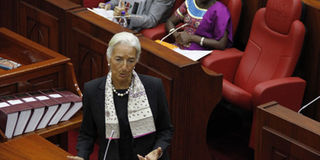Kenya to know fate of IMF emergency loan in March

PHOTO | EMMA NZIOKA IMF managing director Christine Lagarde speaks during a meeting with members of Parliament at County Hall in Nairobi on January 7, 2014.
What you need to know:
- Institution chief promises to remain a steadfast partner to Kenya
- Concluding her two-day visit to Kenya, the first in her position as the IMF managing director, Ms Christine Lagarde told journalists Tuesday that indeed the Kenyan economy has advanced remarkably in the past few years and measures should be taken to guard it from external shocks.
The government will have to wait until March to get an answer to its request for an emergency loan from the International Monetary Fund to help the country withstand looming economic shocks.
Concluding her two-day visit to Kenya, the first in her position as the IMF managing director, Ms Christine Lagarde told journalists Tuesday that indeed the Kenyan economy has advanced remarkably in the past few years and measures should be taken to guard it from external shocks.
“This economy is very sound and should thus not be exposed to economic shocks,” she said.
Ms Lagarde could not delve into whether or not the country would get the requested credit facility, only saying “the IMF has always been Kenya’s steadfast partner—and will remain so into the future.”
At the joint press conference, National Treasury cabinet secretary Henry Rotich, who had advised President Kenyatta to make the request during his meeting with the IMF chief, said the decision on the credit request would only be made after the global lender has assessed the country’s past economic performance as well as proposed policies in an upcoming meeting.
“Further discussions on this shall be considered during the forthcoming Article IV consultation discussions scheduled for March 2014,” he said.
The meeting is held annually between IMF and its member states including developed countries.
Mr Kenyatta made the request in a glowing speech when he hosted Ms Lagarde Tuesday at State House, Mombasa.
“We remain vulnerable to future shocks and we must be able to effectively deal with them if and when they arise….My country needs an insurance-type facility that can be accessed as and when needed with sufficient resources to effectively deal with potential shocks,” Kenyatta said.
“Your style has won you accolades amongst your peers and IMF member states. Calm, cool, persistent. We add, inclusive and considerate. With calm heads, and partners like yourself, we need to take unconventional decisions to fuel prosperity for our people.”
During her visit to Kenya, Ms Lagarde met with top government officials including the speakers of the National Assembly and Senate as well as the parliamentary budget committee.
CONSTANT VIGILANCE
The IMF boss asked MPs to exercise vigilance, scrutiny and good relations with the counties so that devolution can succeed.
“The implementation requires constant vigilance because it’s in the nature of human beings to actually push the boundaries as far as possible and when boundaries are soft, are not checked, then there is no proper control and the very laudable devolution that is needed by the people can then actually get lost,” she said.
Ms Lagarde said Kenya took a laudable step with the enactment of the Constitution in 2010 in terms of “bringing government to the people, the resources closer to the ground and that services are available and nobody is left on the side of the road.”
But the former French Finance minister warned that if not done properly, devolution could cause instability and defeat its whole purpose.
She told MPs of her own struggles as Finance minister in France, where as the central government tightened budgets, the devolved units were not in sync and were doing the opposite.
“No matter how well devolution is designed or implemented, vigilance and scrutiny is going to be key so that you as committees will have to be very rigorous as well as diplomatic,” she added.






